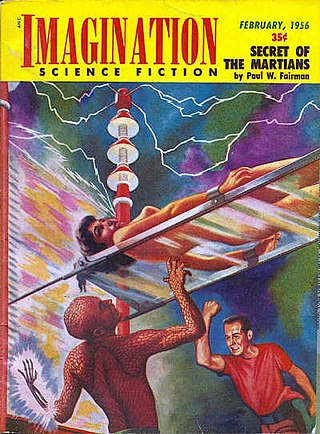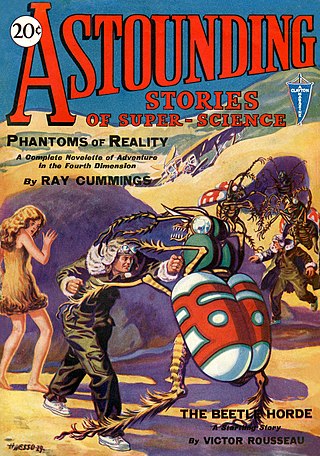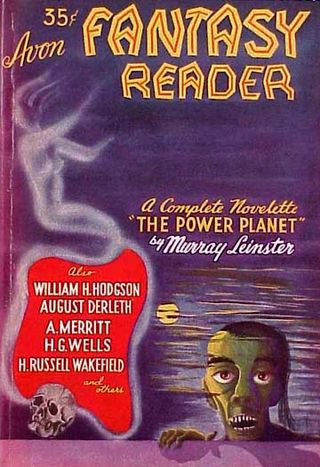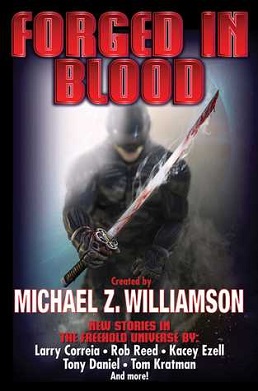Related Research Articles

Interzone is a British fantasy and science fiction magazine. Published since 1982, Interzone is the eighth-longest-running English language science fiction magazine in history, and the longest-running British science fiction (SF) magazine. Stories published in Interzone have been finalists for the Hugo Awards and have won a Nebula Award and numerous British Science Fiction Awards.

Ellery Queen's Mystery Magazine is a bi-monthly American digest size fiction magazine specializing in crime fiction, particularly detective fiction, and mystery fiction. Launched in fall 1941 by Mercury Press, EQMM is named after the fictitious author Ellery Queen, who wrote novels and short stories about a fictional detective named Ellery Queen. From 1993, EQMM changed its cover title to be Ellery Queen Mystery Magazine, but the table of contents still retains the full name.
Flash fiction is a brief fictional narrative that still offers character and plot development. Identified varieties, many of them defined by word count, include the six-word story; the 280-character story ; the "dribble" ; the "drabble" ; "sudden fiction" ; "flash fiction" ; and "microstory".

Room is a Canadian quarterly literary journal that features the work of emerging and established women and genderqueer writers and artists. Launched in Vancouver in 1975 by the West Coast Feminist Literary Magazine Society, or the Growing Room Collective, the journal has published an estimated 3,000 women, serving as an important launching pad for emerging writers. Room publishes short fiction, creative non-fiction, poetry, art, feature interviews, and features that promote dialogue between readers, writers and the collective, including "Roommate" and "The Back Room". Collective members are regular participants in literary and arts festivals in Greater Vancouver and Toronto.

SFX is a British magazine covering the topics of science fiction and fantasy. Its name is a reference to the abbreviated form of "special effects".

A science fiction magazine is a publication that offers primarily science fiction, either in a hard-copy periodical format or on the Internet. Science fiction magazines traditionally featured speculative fiction in short story, novelette, novella or novel form, a format that continues into the present day. Many also contain editorials, book reviews or articles, and some also include stories in the fantasy and horror genres.
Dave Freer is a South African–born, Australian-based, award-winning science fiction author writing mostly humorous or alternate history novels.
The Harrow was an online magazine for fantasy and horror fiction, poetry, and reviews, launched in January 1998 by founder and editor-in-chief Dru Pagliassotti. The magazine has an all-volunteer editorial staff and reviewer pool and uses a double blind review system that provides authors with individualized feedback on their submissions.
Bards and Sages is an American publisher of speculative fiction and role-playing games. The company was founded in 2002 by horror writer and game designer Julie Ann Dawson. The company produces both print and electronic media. The company was nominated for best electronic publisher in 2006 in the annual Preditors and Editors Readers' Poll.

Authentic Science Fiction was a British science fiction magazine published in the 1950s that ran for 85 issues under three editors: Gordon Landsborough, H.J. Campbell, and E.C. Tubb. The magazine was published by Hamilton and Co. in London and began in 1951 as a series of novels appearing every two weeks; by the summer it became a monthly magazine, with readers' letters and an editorial page, though fiction content was still restricted to a single novel. In 1952 short fiction began to appear alongside the novels, and within two more years it completed the transformation into a science fiction magazine.

Analog Science Fiction and Fact is an American science fiction magazine published under various titles since 1930. Originally titled Astounding Stories of Super-Science, the first issue was dated January 1930, published by William Clayton, and edited by Harry Bates. Clayton went bankrupt in 1933 and the magazine was sold to Street & Smith. The new editor was F. Orlin Tremaine, who soon made Astounding the leading magazine in the nascent pulp science fiction field, publishing well-regarded stories such as Jack Williamson's Legion of Space and John W. Campbell's "Twilight". At the end of 1937, Campbell took over editorial duties under Tremaine's supervision, and the following year Tremaine was let go, giving Campbell more independence. Over the next few years Campbell published many stories that became classics in the field, including Isaac Asimov's Foundation series, A. E. van Vogt's Slan, and several novels and stories by Robert A. Heinlein. The period beginning with Campbell's editorship is often referred to as the Golden Age of Science Fiction.
Peter A. Balaskas is an American author of speculative fiction.

Avon published three related magazines in the late 1940s and early 1950s, titled Avon Fantasy Reader, Avon Science Fiction Reader, and Avon Science Fiction and Fantasy Reader. These were digest size magazines which reprinted science fiction and fantasy literature by now well-known authors. They were edited by Donald A. Wollheim and published by Avon.
Shaun Simon is an American comics writer. He is from Clifton, New Jersey. He wrote The True Lives of the Fabulous Killjoys with Gerard Way, lead vocalist of My Chemical Romance, for Dark Horse Comics as well as writing Neverboy, also for Dark Horse. He also wrote Collapser with Mikey Way for DC Comics and The Umbrella Academy spinoff prequel series based on Klaus Hargreeves titled You Look Like Death.

Jason Sanford is an American science fiction author whose 2022 novel Plague Birds was a finalist for the Nebula and Philip K. Dick Awards. He's also known for his short fiction, which has been published in Interzone, Asimov's Science Fiction, Analog Science Fiction and Fact, Year's Best SF 14, InterGalactic Medicine Show and other magazines and anthologies.

The Horror Zine is an American fantasy and horror fiction pulp magazine first published in July 2009. The magazine was set up in Sacramento by Jeani Rector, a novelist and short-story writer with a taste for the macabre. She has been the editor for the magazine's entire run, and is assisted by Dean H. Wild. The Horror Zine has published established, professional writers, including Graham Masterton, Joe R. Lansdale, Piers Anthony, Ramsey Campbell, Elizabeth Massie, Simon Clark, Tom Piccirilli, Melanie Tem, and Bentley Little.

Science-fiction and fantasy magazines began to be published in the United States in the 1920s. Stories with science-fiction themes had been appearing for decades in pulp magazines such as Argosy, but there were no magazines that specialized in a single genre until 1915, when Street & Smith, one of the major pulp publishers, brought out Detective Story Magazine. The first magazine to focus solely on fantasy and horror was Weird Tales, which was launched in 1923, and established itself as the leading weird fiction magazine over the next two decades; writers such as H.P. Lovecraft, Clark Ashton Smith and Robert E. Howard became regular contributors. In 1926 Weird Tales was joined by Amazing Stories, published by Hugo Gernsback; Amazing printed only science fiction, and no fantasy. Gernsback included a letter column in Amazing Stories, and this led to the creation of organized science-fiction fandom, as fans contacted each other using the addresses published with the letters. Gernsback wanted the fiction he printed to be scientifically accurate, and educational, as well as entertaining, but found it difficult to obtain stories that met his goals; he printed "The Moon Pool" by Abraham Merritt in 1927, despite it being completely unscientific. Gernsback lost control of Amazing Stories in 1929, but quickly started several new magazines. Wonder Stories, one of Gernsback's titles, was edited by David Lasser, who worked to improve the quality of the fiction he received. Another early competitor was Astounding Stories of Super-Science, which appeared in 1930, edited by Harry Bates, but Bates printed only the most basic adventure stories with minimal scientific content, and little of the material from his era is now remembered.
Gillian Jerome is a Canadian poet, essayist, editor, university instructor and high-school educator. She won the City of Vancouver Book Award in 2009 and the ReLit Award for Poetry in 2010. Jerome is a co-founder of Canadian Women In Literary Arts (CWILA), and also serves as the poetry editor for Geist. She is a lecturer in literature at the University of British Columbia and also runs writing workshops at the Post 750 in downtown Vancouver.

Forged in Blood is a science-fiction anthology edited by Michael Z. Williamson and published in September 2017 by Baen Books. The book consists of 16 short stories tracing the story of a single sword. The first story takes place in feudal Japan and the book continues in chronological order into the future of Williamson's Freehold universe. Five of the stories are wholly or partly by Williamson and the rest by other authors, including Larry Correia, Tony Daniel and Tom Kratman.
References
- ↑ "Preditors & Editors Readers Poll, Standings for category: Fiction Magazine/e-zines", Critters Workshop.
- ↑ "Preditors & Editors Readers Poll, Standings for All Other Short Stories", Critters Workshop.
- ↑ Vanessa Wieland & Jennifer Benner, "75 Best Online Markets", Writer's Digest, November/December 2010: 24-33
- ↑ Net Worth: Things on the Web Worth Checking Out This Week", The Wall Street Journal, March 29, 2008.
- ↑ Gillian Shaw,"Vancouver website serves up bite sized morsels of fiction", Vancouver Sun.
- ↑ Gillian Shaw, "Serialized flash fiction delivered straight to e-mail" Archived 2012-08-29 at the Wayback Machine , The StarPhoenix, June 26, 2010.
- ↑ Camille Gooderham Campbell, Table of Contents December 2011, Every Day Fiction.
- ↑ Camille Gooderham Campbell, Table of Contents October 2009, Every Day Fiction.